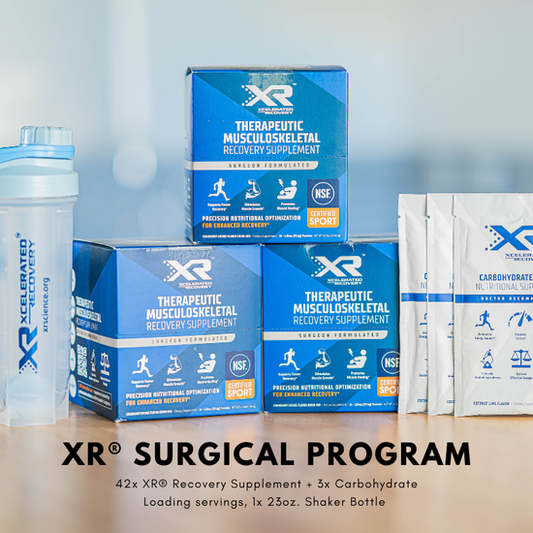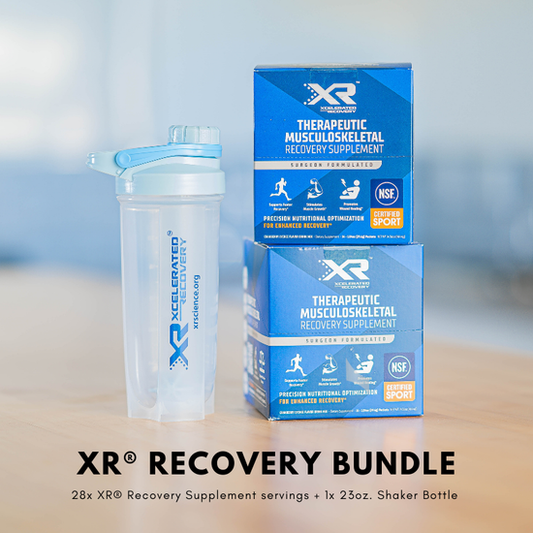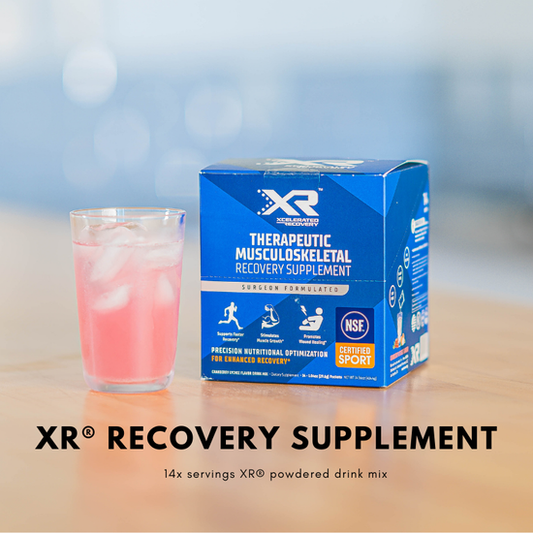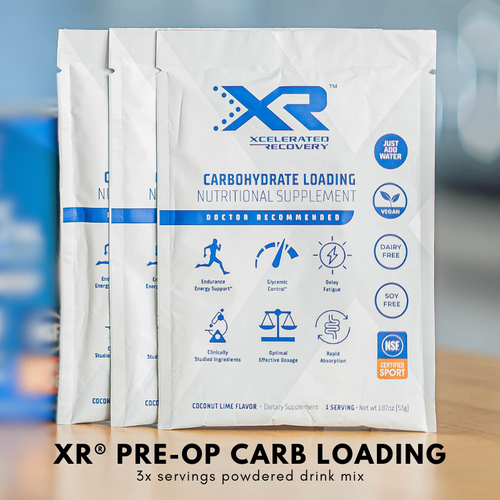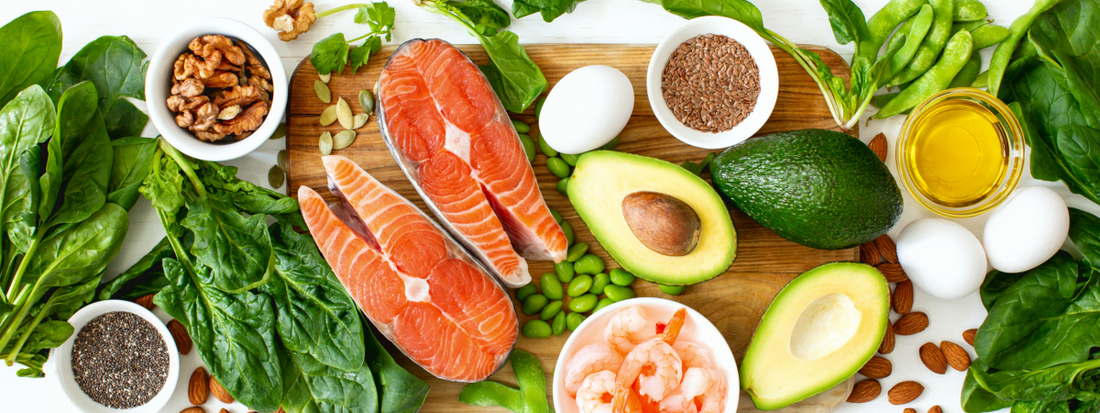
Food as Medicine: Omega-3s and the Power of Nutrition in Your Surgical Recovery
Share
Author: Reza Jazayeri, MD
At Xcelerated Recovery®, we believe that what you put into your body matters—especially during surgery. Your body is preparing for, enduring, and healing from a major event. Just like athletes fuel their bodies for peak performance, you too deserve the same level of nutritional support.
That’s why we emphasize the importance of food as medicine, focusing on whole, nutrient-rich choices that provide the foundation for healing. Among the most important dietary nutrients? Omega-3 fatty acids—a group of healthy fats that play a powerful role in supporting muscle health and optimizing surgical outcomes.
What Are Omega-3 Fatty Acids?
Omega-3 fatty acids are a type of polyunsaturated fat (PUFA). These are essential fats, meaning your body cannot make them on its own—you must get them through food.
Main Omega-3s Important for Recovery:
-
EPA (Eicosapentaenoic Acid) – reduces inflammation
-
DHA (Docosahexaenoic Acid) – critical for cellular membranes, brain, and nerve tissue
-
ALA (Alpha-Linolenic Acid) – plant-based omega-3, must be converted to EPA/DHA (low efficiency)
Fish vs Plant-Based Omega-3s: Why Conversion Matters
While plant-based foods like flaxseed and walnuts are rich in ALA, the body’s ability to convert ALA into the more biologically active EPA and DHA is very limited:
-
Only about 5–10% of ALA is converted to EPA
-
Less than 0.5–5% is converted to DHA
This means that plant-based eaters need to consume significantly more omega-3-rich foods to achieve similar effects to those who consume fish.
🟢 Why Vegans Should Consider Algae-Based Omega-3s:
Algae is the original source of EPA and DHA in the marine food chain. Algae-based supplements:
-
Provide direct sources of EPA and DHA
-
Bypass the inefficient ALA conversion process
-
Are sustainable and 100% plant-based
Why Omega-3s Matter in Surgery and Muscle Health
Surgery—especially orthopedic procedures—induces a catabolic state, where muscle breakdown accelerates, and inflammation increases. Omega-3s are uniquely positioned to counteract this response.
Key Benefits of Omega-3s in Surgical Recovery:
-
Reduce inflammation and pain
-
Support wound and tendon healing
-
Preserve muscle mass during immobilization
-
Improve functional recovery and strength
-
Lower risk of surgical complications
📚 Clinical Highlights:
-
Omega-3s increase muscle protein synthesis in both young and older adults【1,2】
-
Fish oil improves muscle mass and strength in older individuals【3】
-
Omega-3s attenuate muscle atrophy during immobilization【4】
-
Rotator cuff healing and cytokine balance improve with omega-3-rich nutrition【5】
How Much Do You Need?
Clinical research suggests that consuming at least 2,000 mg (2 g) of combined EPA and DHA daily is beneficial for surgical recovery and muscle preservation.
How Much Food to Reach 2 Grams of Omega-3?
|
Source |
Serving Size Needed to Reach 2g EPA/DHA or ALA |
Notes |
|
Salmon (wild) |
~3 oz |
~2,000 mg EPA/DHA |
|
Mackerel |
~3 oz |
~2,500 mg EPA/DHA |
|
Sardines |
~4 oz |
~2,000 mg EPA/DHA |
|
Anchovies |
~5 oz |
~2,000 mg EPA/DHA |
|
Algae Oil Supplement |
1 tsp or 2–3 capsules |
~400–600 mg EPA/DHA per serving |
|
Chia Seeds |
~1 oz (2 tbsp) |
~5,000 mg ALA (~100–200 mg EPA/DHA after conversion) |
|
Flaxseed (ground) |
~1.5 tbsp |
~2,300 mg ALA |
|
Walnuts |
~1 oz (14 halves) |
~2,500 mg ALA |
|
Hemp Seeds |
~3 tbsp |
~2,400 mg ALA |
⚠️ Plant-based ALA needs to be consumed in significantly higher amounts due to limited conversion to EPA/DHA.
Top Omega-3-Rich Foods by Category
🐟 Fish (EPA/DHA)
-
Mackerel
-
Salmon
-
Sardines
-
Anchovies
-
Herring
-
Trout
🌱 Plant-Based (ALA)
-
Flaxseeds (ground)
-
Chia seeds
-
Walnuts
-
Hemp seeds
-
Brussels sprouts
-
Edamame
🟢 Algae-Based (Vegan EPA/DHA)
-
Algae oil supplements
-
Nori and seaweed (minimal but present)
Our Philosophy at Xcelerated Recovery®
At XR® we go far beyond supplements. We believe in empowering patients to heal from the inside out by emphasizing food-first, science-backed strategies.
What We Provide:
-
A personalized dietary plan using our Muscle-Centric Calculator™
-
Targeted food lists rich in bioactive healing nutrients, including omega-3s
-
Strategies that are easy to follow, evidence-based, and whole-food focused
-
Supplements to complement—not replace—your nutritional foundation
Whole foods are the foundation—because food is your most powerful medicine.
Fuel Your Healing—One Smart Choice at a Time.
Start your personalized healing nutrition plan, powered by science and built for outcomes.
References
- Smith GI, Atherton P, Reeds DN, Mohammed BS, Rankin D, Rennie MJ, Mittendorfer B. Omega-3 polyunsaturated fatty acids augment the muscle protein anabolic response to hyperinsulinaemia–hyperaminoacidaemia in healthy young and middle-aged men and women. Clin Sci. 2011;121(6):267–78.
- Smith GI, Atherton P, Reeds DN, Mohammed BS, Rankin D, Rennie MJ, et al. Dietary omega-3 fatty acid supplementation increases the rate of muscle protein synthesis in older adults: a randomized controlled trial. Am J Clin Nutr. 2011;93(2):402–12.
- Smith GI, Julliand S, Reeds DN, Sinacore DR, Klein S, Mittendorfer B. Fish oil–derived n-3 PUFA therapy increases muscle mass and function in healthy older adults. Am J Clin Nutr. 2015;102(1):115–22.
- McGlory C, Gorissen SHM, Kamal M, Bahniwal R, Hector AJ, Baker SK, et al. Omega-3 fatty acid supplementation attenuates skeletal muscle disuse atrophy during two weeks of unilateral leg immobilization in healthy young women. FASEB J. 2019;33(3):4586–97.
- Heller T, Asplund M, Sherman S, Kim HJ. Nutritional intervention and tendon healing: the role of omega-3 fatty acids in rotator cuff repair. J Shoulder Elbow Surg. 2022;31(2):340–347.
- Calder PC. Omega-3 fatty acids and inflammatory processes: from molecules to man. Biochem Soc Trans. 2017;45(5):1105–15.
- Brenna JT, Salem N Jr, Sinclair AJ, Cunnane SC. α-Linolenic acid supplementation and conversion to n–3 long-chain polyunsaturated fatty acids in humans. Prostaglandins Leukot Essent Fatty Acids. 2009;80(2–3):85–91.
- Ramasamy, S., Jain, S., Kori, R., Atri, S., & Singh, C. (2022). Role of Omega-3 Fatty Acid Infusion in Surgical Outcomes of Perforation Peritonitis Patients: A Randomized Controlled Trial. Cureus, 2022-04-01.
- Athanasiou, A., Charalambous, M. A., Anastasiou, T., & Soteriades, E. S. (2025). Pre- and post-operative administration of omega-3 polyunsaturated fatty acids in cardiac surgery patients. Annals of Medicine and Surgery, 2025-03-18.
- Mohsen, G., Stroemer, A., Mayr, A., Kunsorg, A., Stoppe, C., Wittmann, M., & Velten, M. (2023). Effects of Omega-3 Fatty Acids on Postoperative Inflammatory Response: A Systematic Review and Meta-Analysis. Nutrients, 2023-07-31.
- Yang, T., Velagapudi, R., Kong, C., Ko, U., Kumar, V., Brown, P., Franklin, N. O., Zhang, X., Caceres, A., Min, H., Filiano, A., Rodriguiz, R., Wetsel, W., Varghese, S., & Terrando, N. (2022). Protective effects of omega-3 fatty acids in a blood–brain barrier-on-chip model and on postoperative delirium-like behaviour in mice. BJA: British Journal of Anaesthesia, 2022-06-01.
- Lu, S., Yang, Z., Tang, H., Sun, X., Wang, B., Qu, J. L., Wang, Y., & Rao, B. (2022). Associations between omega-3 polyunsaturated fatty acids supplementation and surgical prognosis in patients with gastrointestinal cancer: A systematic review and meta-analysis. Food Chemistry: Molecular Sciences, 2022-03-01.
- Linecker, M., Botea, F., Raptis, D. A., Nicolaescu, D., Limani, P., Alikhanov, R., Kim, P., Wirsching, A., Kron, P., Schneider, M., Tschuor, C., Kambakamba, P., Oberkofler, C., de Oliveira, M. D., Bonvini, J., Efanov, M., Graf, R., Petrowsky, H., Khatkov, I., Clavien, P., & Popescu, I. (2020). Perioperative Omega-3 fatty Acids Fails to Confer Protection in Liver Surgery. Journal of Hepatology, 2020-03-01.
- Kahlenberg, Z. B., Rodriguez, M., Brenner, A., & Kaklamani, V. (2020). Evaluating the Impact of Omega-3 Free Fatty Acid Supplementation on Postoperative Complications in Obese Postmenopausal Women With Estrogen Receptor Positive Breast Cancer. The American Surgeon™, 2020-12-19.
- King, V., Huang, W., Dyall, S., Curran, O. E., Priestley, J., & Michael-Titus, A. (2006). Omega-3 Fatty Acids Improve Recovery, whereas Omega-6 Fatty Acids Worsen Outcome, after Spinal Cord Injury in the Adult Rat. The Journal of Neuroscience, 2006-04-26.
- George, J., White, D., Fielding, B., Scott, M., Rockall, T., & Whyte, M. (2023). Systematic review of preoperative n-3 fatty acids in major gastrointestinal surgery. BMJ Surgery, Interventions, & Health Technologies, 2023-06-01.
- Bilku, D., Hall, T., Al-Leswas, D., & Dennison, A. R. (2012). Can enhanced recovery programmes be further improved by the addition of omega three fatty acids? Irish Journal of Medical Science, 2012-03-22.
- Rittenhouse, M., Khurana, S., Scholl, S., & Emerson, C. (2025). Examining the Influence of Omega-3 Fatty Acids on Performance, Recovery, and Injury Management for Health Optimization: A Systematic Review Focused on Military Service Members. Nutrients, 2025-01-01.
- Osouli-Tabrizi, S., Mehdizadeh, A., Naghdi, M., Sanaat, Z., Vahed, N., & Farshbaf-Khalili, A. (2023). The effectiveness of omega-3 fatty acids on health outcomes in women with breast cancer: A systematic review. Food Science & Nutrition, 2023-05-22.
- Siritientong, T., Thet, D., Buangbon, M., Nokehoon, P., Leelakanok, N., Methaneethorn, J., Angspatt, A., & Meevassana, J. (2022). Nutritional Support with Omega-3 Fatty Acids in Burn Patients: A Systematic Review with Meta-Analysis of Randomized Controlled Trials. Nutrients, 2022-07-01.
- Déniz, C., Raba-Parodi, C., García-Raimundo, E., Macía, I., Rivas, F., Ureña, A., Muñoz, A., Moreno, C., Serratosa, I., Masuet-Aumatell, C., Escobar, I., & Ramos, R. (2022). Preoperative Omega-6/Omega-3 Fatty Acid Ratio Could Predict Postoperative Outcomes in Patients with Surgically Resected Non-Small-Cell Lung Cancer. Current Oncology, 2022-09-28.
- Zhu, M., Li, M., Yang, S., Li, J. X., Gong, C., Yu, Q., Chen, C., Zhang, Y., Lin, J. Y., & Tu, F. (2023). Fish oil omega-3 Fatty Acids Alleviate Postoperative delirium-like Behavior in aged mice by Attenuating Neuroinflammation and Oxidative Stress. Neurochemical Research, 2023-08-29.
- Liang, B., Wang, S., Ye, Y., Yang, X. D., Wang, Y. L., Qu, J., Xie, Q., & Yin, M. (2008). Impact of postoperative omega-3 fatty acid-supplemented parenteral nutrition on clinical outcomes and immunomodulations in colorectal cancer patients. World Journal of Gastroenterology, 2008-04-21.





